| Srl | Item |
| 1 |
ID:
073848
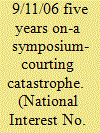

|
|
|
| 2 |
ID:
073739
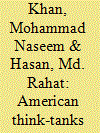

|
|
|
| 3 |
ID:
074397
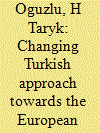

|
|
|
| 4 |
ID:
073410
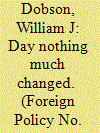

|
|
|
| 5 |
ID:
074827
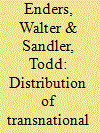

|
|
|
|
|
| Publication |
2006.
|
| Summary/Abstract |
This article applies an autoregressive intervention model for the 1968-2003 period to identify either income based or geographical transference of transnational terrorist events in reaction to the rise of fundamentalist terrorism, the end to the Cold War, and 9/11. Our time-series study investigates the changing pattern of transnational terrorism for all incidents and only those involving U.S. people and property. Contrary to expectation, there is no evidence of an income-based post-9/11 transfer of attacks to low-income countries except for attacks with U.S. casualties, but there is a significant transference to the Middle East and Asia where U.S. interests are, at times, attacked. We also find that the rise of fundamentalist terrorism has most impacted those regions-the Middle East and Asia-with the largest Islamic population. The end to the Cold War brought a "terrorism peace dividend" that varies by income and geography among countries. Based on the empirical findings, we draw policy recommendations regarding defensive counterterrorism measures.
|
|
|
|
|
|
|
|
|
|
|
|
|
|
|
|
| 6 |
ID:
075317
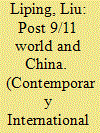

|
|
|
| 7 |
ID:
075049
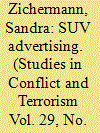

|
|
|
|
|
| Publication |
2006.
|
| Summary/Abstract |
Since the attacks of 9/11, the issue of global terrorism has been on many people's minds. The paramount goals for governing powers and concerned organizations are how to effectively protect national borders and citizens. Many organizations, such as The Detroit Project, have been very vocal about their decision not to consume certain goods or use certain services that may be from countries that pose a grave risk to the United States.
|
|
|
|
|
|
|
|
|
|
|
|
|
|
|
|
| 8 |
ID:
073685
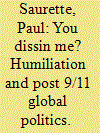

|
|
|
|
|
| Publication |
2006.
|
| Summary/Abstract |
Despite a growing awareness about the importance of emotions to global politics, the discipline of International Relations is still working towards adequate theorisations and investigations of their role. This is particularly noticeable in the fact that there has been little sustained, scholarly examination of the effects of various emotions on the shape and orientation of the US foreign policy reaction to 9/11. This essay seeks to begin to address both of these gaps by examining the role that dynamics of humiliation and counter-humiliation have played in contemporary global politics. In particular, it develops a theoretical understanding of humiliation and then applies this framework to explain how dynamics of humiliation have impacted post 9/11 American global policy. It concludes that we cannot fully understand the sources, and the effects, of post 9/11 contemporary politics (especially US global policy) without taking into account the dynamics of humiliation.
|
|
|
|
|
|
|
|
|
|
|
|
|
|
|
|